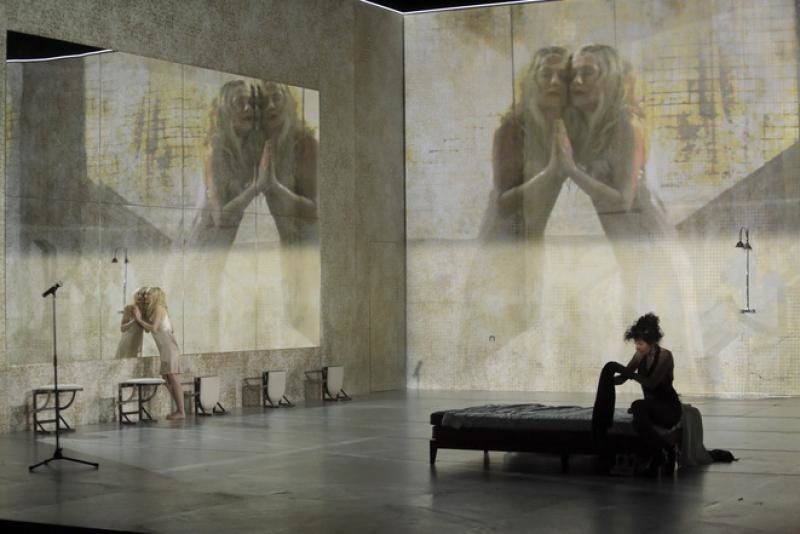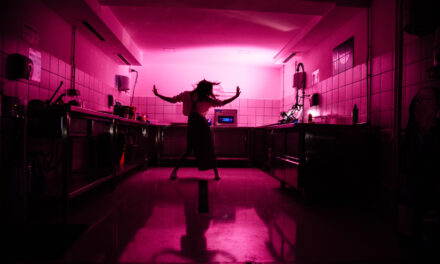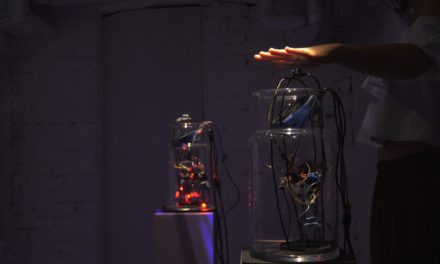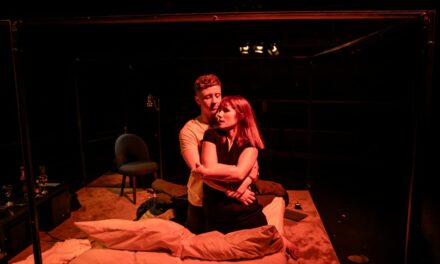Polish theatre director Krzysztof Warlikowski’s Phaedra(s) is in London from the Odeon Theatre de l’Europe in Paris. An ambitious play, it’s made up of three very different versions of the Greek myth of Phaedra, wife of King Theseus, who is seized by a passionate and fatal love for her stepson Hippolytus. Three and a half hours long, it leaves you feeling at the end like your head’s been through a particularly turbulent dishwasher cycle–in a good way, sort of, though this is definitely not one for the squeamish.
For Part One, Isabel Huppert struts on as Aphrodite in the guise of a high-class porn star–in a blond wig, stripper heels, fur, and latex. A post-modern take on the plays of Euripides and Seneca by a Lebanese-Canadian author, Wajdi Mouawad, it’s crazy theatre. While dancer Rosalba Torres Guerrero–in a sparkly bikini–gyrates manically in the background, Huppert as Aphrodite tells us: “the world was born out of my cunt.” She then turns into Phaedra and what follows is an assault of menstrual blood, vomiting, moaning, orgasms, and stabbings. It’s revolting, uncomfortable and frankly bizarre, but you stay glued to your seat–partly to see if it can get any weirder but mostly because Huppert’s unrestrained and honest performance compels you to. The play’s being in French, a language which makes all levels of lewdness sound chic, definitely softens the blow too.
Part Two–and the play’s centerpiece–is a revival of Sarah Kane’s 1996 Phaedra’s Love, a masterpiece of black humor. Perhaps a more subtle interpretation of myth, it is, however, no less peculiar. Huppert’s Phaedra is now a redhead dressed in pink, playing a modern-day Queen. Huppert makes you cringe as her tiny awkward frame tries painfully to be seductive. Meanwhile, the traditionally chaste and upstanding Prince Hippolytus (Andrzej Chyra) is here a lascivious and loathsome layabout confined to his bedroom–a glass box in the center of the stage–where he sleeps, has sex, eats hamburgers, masturbates with a sock and watches the Psycho shower scene on repeat. Not only does Phaedra perform fellatio on her step-son, so then does a priest.
Part Three comes as a light relief and is by far the most compelling and refined stage of the evening. Huppert takes on the role of J M Coetzee’s eponymous character, the novelist Elizabeth Costello, with great wit and finesse. As Costello gives a lecture on Eros, delving into the question of sex between the Gods and humans, she proclaims: “Gods are the inventors of death and the inventors of sex tourism.” The Gods, she concludes, envy humans for their mortality and more importantly for their ability to experience ecstasy in orgasm. She then turns suddenly from Costello into Phaedra who laments her love of Hippolytus in a way which seems more mature and collected than in the earlier parts of the show.
Phaedra(s) is a multiple oxymoron: when all three sections come together, the result’s a pleasurable ordeal or a triumph which shouldn’t or doesn’t really work–but somehow does. A cynic might suggest Warlikowski’s showing off a bit. But beyond question is that Isabel Huppert’s return to London stage after 20 years away will be tattooed on our minds for at least another 20. Her performance is rampantly magnetic throughout, with each take on Phaedra as real and raw as the last.
This article originally appeared in Central and Eastern Europe London Review on May 16, 2016, and has been reposted with permission.
This post was written by the author in their personal capacity.The opinions expressed in this article are the author’s own and do not reflect the view of The Theatre Times, their staff or collaborators.
This post was written by Olenka Hamilton.
The views expressed here belong to the author and do not necessarily reflect our views and opinions.


















